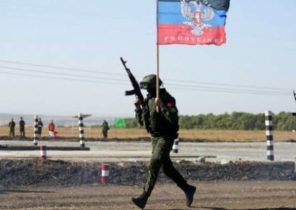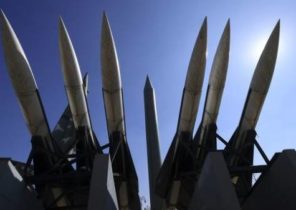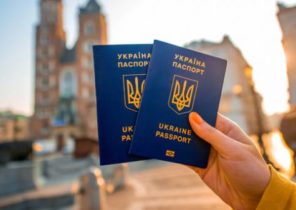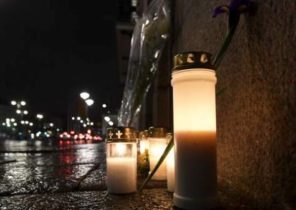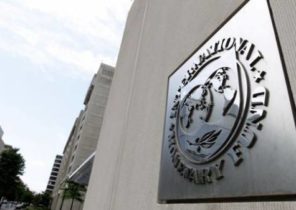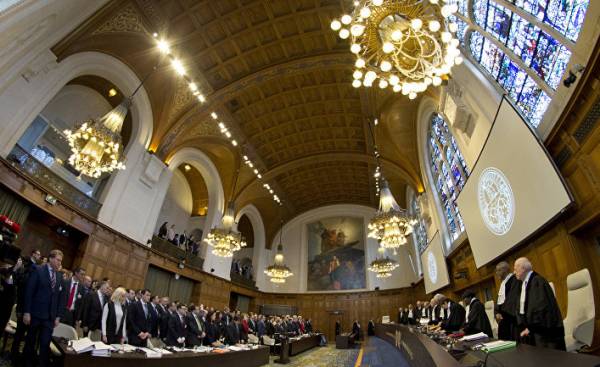
On Wednesday 19 April, the international Court of justice will announce its first decision on the complaint of Ukraine against the Russian Federation. The verdict on the so-called “interim measures” will read out in the Hague at four p.m., Kyiv time. But we can already say: not all request of Kiev will be satisfied.
Moreover, the court may impose restrictions on the Ukrainian side — despite the fact that the defendant is Russia, not Ukraine. So, try to understand: whether we are talking about “zrade”; why should not hope for complete satisfaction of our claim; what are the points of decisions of the court are key for us, and which is quite unrealistic? And finally, how will the current solution (with all possible options) on the final verdict of the ICJ, that is, to punish Russia for its crimes? All this — the article before the publication of the decision of the Hague court.
That solved?
Legal matter is a delicate thing, and international law — even more so. It is not surprising that mention of the trial, which began in the International Court of justice in the Hague, often contain errors. It is sometimes called by the Tribunal (which is fundamentally wrong), sometimes confused with other organs located in the Hague, sometimes impose unreasonable expectations.
Therefore it is necessary to explain what needs to manifest in the Hague on 19 April in the case of “Ukraine against Russia.” This is not a decision on the merits, but that its significance is not falling. The Court must not impose restrictions on the Russian side, or to refuse to do it. As you know, Ukraine is accusing Russia of violating two conventions: on the financing of terrorism and racial discrimination (by the way, pay no attention to the fact that this term sounds strange, the Convention also refers to ethnic and other types of discrimination). According to the rules of the Court of justice, on the defendant country can be restrictions even before the beginning of case consideration on the merits. At this stage we are in now.
And this is not a formality. Kiev asks the court a lot: here and the immediate resumption of the activities of the Mejlis of the Crimean Tatar people, and the prohibition of supplies to the militants “L/DNR” (we have already published a full translation of claims and claims; a list of the requested provisional measures at the end of the publication). The interim verdict of the ICJ would significantly determine what may be the final judicial decision in our suit.
But the most important thing is that all requested restrictions, if approved in the Hague, give Ukraine an additional lever of pressure on Russia and additional trump cards in the process. Russia will be obliged to stop the supply of weapons to militants, but it will not do this? Well, the world will receive one more proof that Russia do not care about international law, and the Hague will be presented additional evidence of disrespect by the Russian side to the Court of justice. One problem: the belief that to approve the judgment, still there even in mid — EP this was confirmed by several officials responsible for legal support of the process.
Victory is not in the pocket
Source “zrada” from experience, are very often exceeding expectations. It can strike in Ukraine and the Hague. “European truth” in detail followed by the beginning of the process where parties submit a position for approval of provisional measures. Readers of these lines probably read our publications about the lies in the testimony of the Russian government and the report of the agent of Ukraine in the Hague and justification of the Ukrainian position. And if we judge by “human standards”, Ukraine’s victory seemingly not in doubt. But the legal process is more complex. Russia is not trying to prove that we’re wrong. They have another argument: Russia insists that the Court of justice has no right to decide this dispute. It is here — the biggest threat to our claim. On this was based the legal position of the Russian Federation at a hearing in March.
On this pierced at the time, Georgia — complaint filed after Russian attacks on South Ossetia, rejected not because of the rightness of Russia, namely, for formal reasons, which allowed the court to say that it has no jurisdiction to consider the complaint. Interesting detail: the presence jurisdiction is defined twice. First, the Court decides whether he has jurisdiction prima facie (literal translation — “the jurisdiction at first sight”). This is a necessary prerequisite to the Court of justice adopted the decision on provisional measures. And then, after a year or two, the final decision about jurisdiction; it is necessary to make a decision on the merits. Georgia passed the first stage and the second stopped. And on Ukrainian complaint both jurisdiction — prima facie and final — will be confirmed even twice. As already mentioned above, we accuse Russia of violating two conventions, each decision is made separately.
And now the good news. The Georgian example gives reason to expect that the court will announce a positive decision for at least one of the conventions. We are talking about the “anti-discrimination” Convention, where we are questioning Russia’s actions in Crimea. The fact that the Georgian complaint concerned the same Convention. She was prepared for much worse than Ukrainian (Georgia appealed to the court just five days after the start of Russian aggression), and still in the Hague there were voices in order to adopt provisional measures. At the second Convention, where we are talking about aggression in the Donbas, there is no such certainty.
“If the Court will not deviate from the logic of 2008, on the Convention on the elimination of all forms of racial discrimination, the chances of the acceptance of prima facie jurisdiction in the case “against Ukraine” is very high… In the case of the Convention on the suppression of the financing of terrorism, the Court enters uncharted territory — nothing to do with it, the ICJ had not considered,” explains international lawyer Nicholas Gnatowski (interview-review Grotovskogo read below in this publication). Perhaps the Ukrainian reader think that the financing of terrorists from the Russian Federation is obvious, but lawyers there is no certainty. Even the foreign Ministry admit that it all depends on what interpretation the Convention would choose a Court of justice. Nicholas Gnatowski does not exclude that the Court will decide to “get rid of Ukrainian business” and will make a decision about the absence of even prima facie jurisdiction, so as not to open the first hearing on the Convention on combating terrorism. A formal reason for it.
Interesting detail: at the hearings in the Hague, the Russians did not dispute the fact that the Buk that shot down a passenger Boeing, was imported from Russia and after the shot returned to Russia. Protection of the Russian Federation has concentrated on proving that the operators of anti-aircraft missile complex had no intent to force down a passenger plane. Another line of Russia — an attempt to prove that in times of war terrorism is impossible in principle. Ukraine proves, that war and terrorism are encountered simultaneously. “The legal position of Ukraine is very well justified; the question is, what position will the Court”, — said the adviser to the Minister of foreign Affairs Taras Kachka. “However, Russia needs not to apply measures at all. Therefore, temporary measures in any wording would be a victory for Ukraine”, — he stressed.
Restrictions for Ukraine
From Meade do have reason to believe a victory in the adoption of any provisional measures (more precisely, their disapproval would mean our defeat). However, wording is also important. “Not all requests will be satisfied in Kiev”, — stated in the beginning of the article. This really is possible to talk already now, before the publication of the decision. There is no doubt that lawyers who formed the Ukrainian “interrogation position,” also understood: the court will not agree to everything. The most striking example of Ukraine’s request that the Court obliged the Russian Federation to suspend the decree of Putin about banning Majlis. According to the author of these lines, chances of satisfaction of this item is close to zero. And it will not be the fault of Ukraine. At this stage, the Hague, most likely, will not mention specific organizations — neither the Majlis nor “L/DNR”. Most likely on Wednesday we will get a solution, not at all like what we asked for.
But there is one point that deserves special attention. In the documents submitted by Ukraine to the Hague, he sounds so: “the Russian Federation must stop and prevent the implementation of all remittances from the Russian Federation, as well as the supply of weapons, vehicles, equipment, training of groups engaged in terrorist acts against the civilian population in Ukraine, or those, on which the Russian Federation it is known that they can participate in terrorist acts in the future, including, but not limited to “DNR”, “LNR”, a group of “Kharkov partisans” and related groups and persons.”
And here is important, not the wording (it is not exactly preserved). The essence is important. If in the intermediate Court’s decision, the UN will remain a direct ban on Russia’s support of militants, it will talk about the undeniable victory of Ukraine. And, finally, that will almost certainly be the solution and that is definitely not “zradoyu”. The court often imposes interim measures on both sides of the process. Particularly for complaints, similar to Ukrainian. So don’t be surprised if in the Court’s decision will be restrictions and requirements to us — their appearance expect all international lawyers who spoke with the EP. Of course, in case prima facie jurisdiction will generally be confirmed.
Almost certainly the Court of justice oblige Ukraine to respect the rights of national minorities (after all, the Russians in the Hague documents give us the usual myths about the “oppression of Russian”). It is likely that judges will remind both Moscow and Kiev on the inadmissibility of terrorist activities, from whom it came. According to one of the assumptions the court may be referred to as Pro-Russian militants and Ukraine’s “volunteer battalions”. This does not mean they are uniform; this is only to testify that Kiev will have to convince the Hague that the reform dobrobatov completed and offenders are punished regardless of whether they have military experience. All of these tasks to Kiev is easy to perform. Importantly, interim measures were generally approved. This, as well as their contents we learn very soon. In — interview-Nicholas Grotovskogo review, international lawyer, President of the European Committee for the prevention of torture and inhuman or degrading treatment, in which he talks about the possible actions of Kiev – including in the case on Wednesday, the Court of justice decides in favor of Ukraine.
— Can we be confident in the recognition by the court of prima facie jurisdiction under both conventions? If not — then which of the conventions, the situation is more blurred?
In such cases, you can never be sure. Of course, if we talk about the Convention on the elimination of all forms of racial discrimination (CERD, in English- CERD), it begs a mention of the case “Georgia against Russia”. In 2008, the international Court of justice issued an order on provisional measures at the request of Georgia. If the Court will not deviate from the logic of 2008, on the Convention
the chances of the acceptance of prima facie jurisdiction in the case “against Ukraine” is very high. However, we should not forget that, first, in 2008, the order of the ICJ was adopted only by a narrow margin of votes (8 votes against 7 judges), and secondly, in the end international the Court of Georgia rejected. In the case of the Convention for the suppression of the financing of terrorism (CSFT), the international Court was entering uncharted territory — nothing to do on it, the ICJ had not considered. Something vaguely similar happened, except that in cases of tragedy over Lockerbie (1988 explosion aboard the Boeing 747, organized by the government of Libya, killed 270 people), but here the analogy is indirect. In our case, the international Court at the stage of provisional measures is facing an important choice: he can either perform an important function of international justice in the fight against terrorism, issuing an order on provisional measures and having further considered the merits of the case; or as soon as possible to find a formal reason to deny Ukraine in the consideration of this complaint.
The second option would be an unfortunate loss of the International Court of justice unique chance to become a truly important international body, but of course, it will make life easier for the judges because it will require much less professional work. To get rid of Ukrainian Affairs just. For example, it is possible to take the dispute settlement procedure prior to his transfer which is more complex than that provided in CERD, and requires, in addition to negotiations, the creation of arbitration, and to evaluate the relevant efforts of Ukraine as insufficient (qualifying offer of Ukraine to establish an ad hoc chamber of the International Court as not being a proposal to create an arbitration). Another option is to accept a paradox as it very diplomatically called the Ukrainian side, the argument of representatives of Russia, the state is obliged to prevent terrorism does not include a duty to him not to use, etc.
— It is known that the court in its findings often imposes restrictions on both sides of the conflict. But how is it possible in the Ukrainian case, if both conventions our demands relate exclusively to the actions of Russia, which Kiev does not affect (for example, the ban of the Mejlis or the supply of weapons to militants “L/DNR”)?
— Always it is possible to formulate appropriate actions in an abstract language, plus add what is under the control of Ukraine. For example, it is possible to demand from the Ukrainian side not to obstruct the delivery of humanitarian aid, etc.
— Circulated in the court’s case-law approach, when temporary measures completely rewritten and issued something different?
— Yes, quite common. This happened not only in the case most similar to ours — “Georgia vs Russia” in 2008, but in several other cases, in particular “Democratic Republic of the Congo V. Uganda” (order of the International Court on provisional measures 2000), “Cameroon V. Nigeria” (1998), “Bosnia and Herzegovina V. Yugoslavia/Serbia and Montenegro” (1993). the Court has repeatedly stressed that he has the authority to take interim measures, partially or completely different from those which it requested States. Moreover, the Court has the right to take provisional measures, even if the parties hadn’t asked for, on its own initiative (proprio motu). The court notes that the purpose of provisional measures is to ensure the rights that form the subject of the hearing.
— If in the end, the ICJ denied provisional measures in at a Convention would it mean for us that in considering the merits of the case we are close to losing?
— Of course, this is a bad sign, although formally considered further. Only on Wednesday will announce an order (order) International Court of justice on provisional measures, to the decision (judgment) is far away. If the content of the order is very bad, Ukraine would do well to think about how to “get” the Court to the other side. One possible, albeit difficult ways is the circulation of the UN General Assembly to the International Court with the request for an Advisory opinion. In this case, you will not need to be limited to the subject of conventions (CERD, or CSFT), and it is possible to put broad issues of qualification of actions of the Russian Federation in Crimea and possibly in the Eastern regions of Ukraine. Although the Advisory opinion, in contrast to the decision in a dispute between States does not in itself create legal obligations, its practical value for Ukraine is unlikely to be significantly lower.
